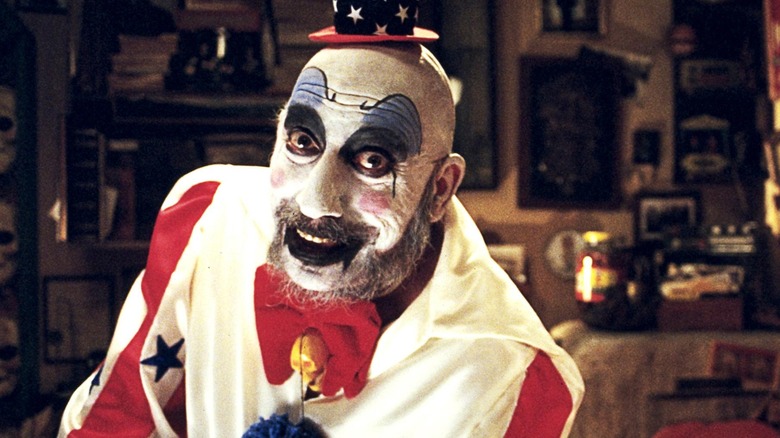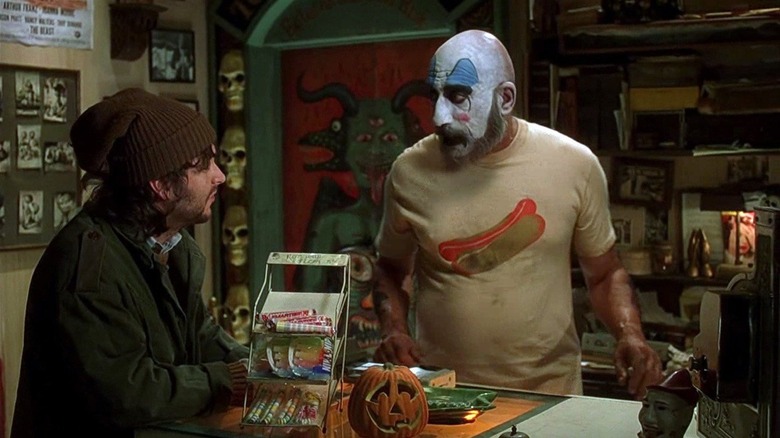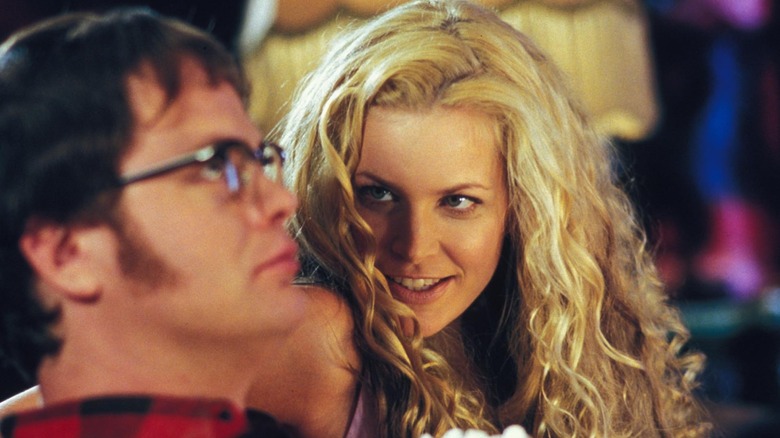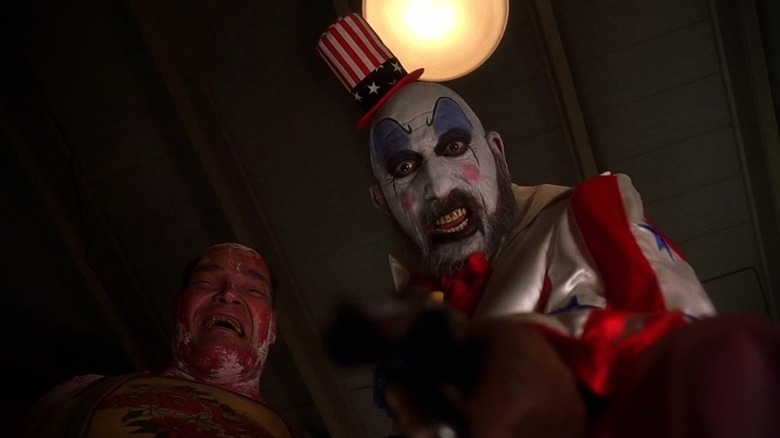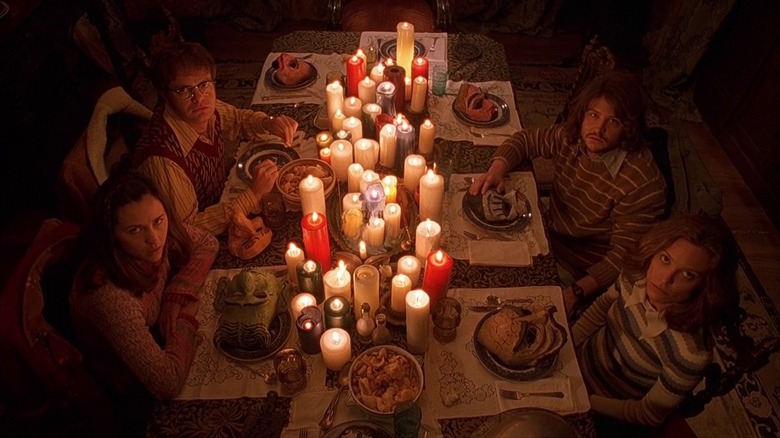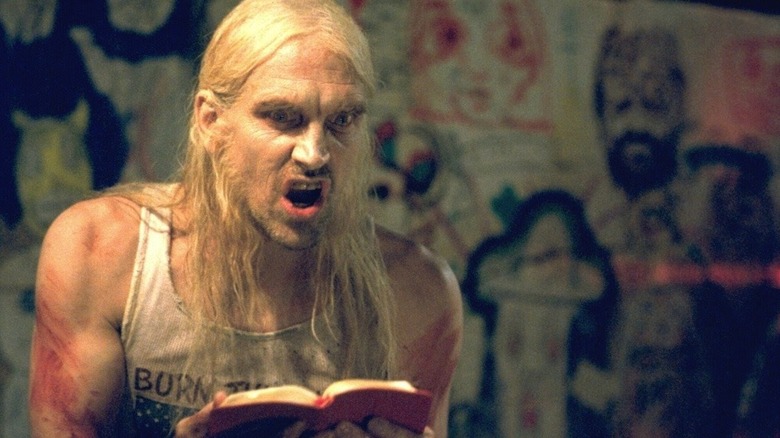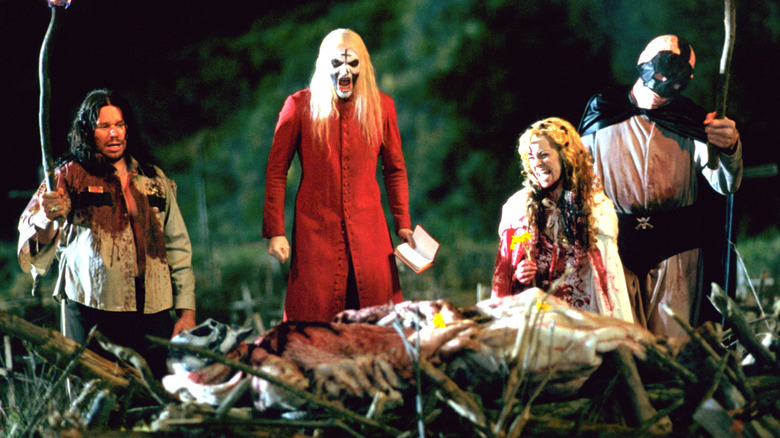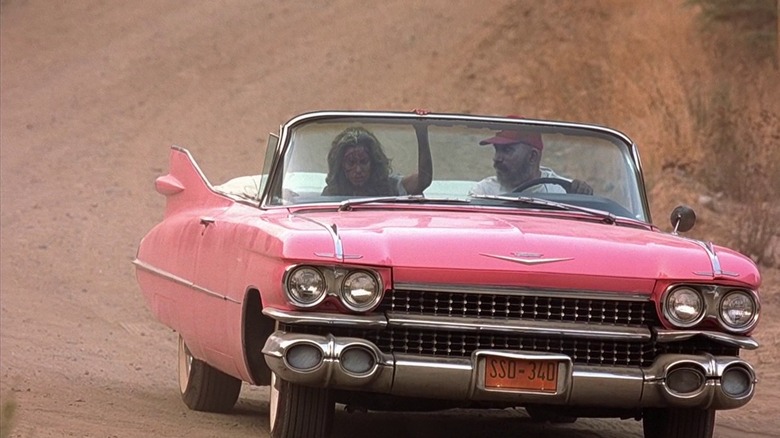Tales From The Box Office: Rob Zombie's House Of 1000 Corpses Was The Cult Horror Hit No Studio Wanted
(Welcome to Tales from the Box Office, our column that examines box office miracles, disasters, and everything in between, as well as what we can learn from them.)
Rob Zombie is an incredibly successful recording artist, known for songs like "Dragula" and "Living Dead Girl," as well as his song "More Human Than Human" with the band White Zombie, with nearly 6 million albums sold. That is one heck of a career spanning over three decades, and that's not including the man's movie career, which has been going steady for 20 years now, dating back to 2003's gory cult classic "House of 1000 Corpses." But, unlike his music career, Zombie's movie career got off to an incredibly rocky start — and at first, it seemed like his debut feature would never see the light of day.
"It was a f***ed up journey to make it all good," Zombie recently said to Entertainment Weekly on the experience of making his first film. Indeed, it was f***ed up. Though that messy journey did, in the end, provide the best-selling recording artist with a filmmaking career, and gave Lionsgate (who was really looking to make a name for itself in the industry) a cult hit for its relatively young library. But how did a movie produced by Universal Pictures end up in the hands of a studio that was only a handful of years old at the time? That's what we're here to discuss.
In honor of the 20th anniversary of "House of 1000 Corpses," we're looking back at Rob Zombie's first movie, how it all started with an actual haunted house attraction, how it went south after filming was completed, what happened when it finally did hit theaters, and what lessons we can learn about it all these years later. Let's dig in, shall we?
The movie: House of 1000 Corpses
Despite his success in mainstream rock music, Rob Zombie had always loved horror films and had his sights set on directing. Leading up to his feature directorial debut, he had helmed several music videos and had even had some close calls with other films. Zombie actually had, at one point, been attached to write and direct the third entry in "The Crow" franchise, though that didn't come to pass. But around the time everyone was freaking out about Y2K, Zombie got hooked up with the folks at Universal Pictures. In that same EW interview, he explained how things came together rather quickly.
"It happened so fast that I kind of pitched a half-assed idea because it wasn't like I'd really been developing this pet project. It just seemed like it kind of kept going. It was the easiest I ever got a movie made! It was almost like we were so below Universal's radar that it just sort of kept bouncing ahead until we were making a movie. That they didn't want! [Laughs]"
That movie became "House of 1000 Corpses," which Zombie actually cooked up while putting together a maze for Universal's Halloween Horror nights. The movie as we know it centers on two young couples taking a tour along the back roads of America in search of a local legend known as Dr. Satan. Unfortunately, when they become stranded with no options, they cross paths with a family of psychos — the Firefly Family — and murder ensues.
Zombie penned the screenplay himself and things barreled forward at a blistering pace by big movie studio standards. With a cast that included the likes of Chris Hardwick after his MTV days, Rainn Wilson before his fame from "The Office," Sheri Moon Zombie, Sid Haig, and Bill Moseley as the Firefly Family, production began in May 2000. All seemed well at first.
Trouble brews at the studio
Filming seemed to go over pretty well, and Zombie was given a healthy budget (especially considering it was his debut feature). The amount has always been debated, with the filmmaker himself citing multiple figures over the years. It was originally said to be in the $3 to $4 million range. "I don't know how much it cost. It cost way too much, I know that," Zombie said in 2014. "Maybe it cost somewhere between $7 and $14 [million]." Whatever the budget was, money wasn't really the issue.
"We were shooting it with Universal Studios, so the money was just getting pissed away. Wow, you ask for anything and it suddenly appears! We're gonna build this huge Dr. Satan set, it's gonna be $3 million. Okay! At that time, to Universal Studios, we were making this tiny indie movie that nobody was paying attention to."
The only issue, budget-wise, was the ending. Somewhat strategically, Zombie blew most of his budget shooting the rest of the movie. When it came time to shoot the ending, it "sucked," per the director's own words. But he knew that, and that's exactly how he managed to get money to shoot the ending he wanted to shoot. Speaking with Christian Divine around the time of the release, Zombie explained:
"I knew the ending sucked, so I let it suck and they said, 'The movie's great but the ending sucks' and I know. So they gave me more money and we shot a more elaborate ending, bigger sets, the whole razzamatazz. All through, Universal was loving it."
Universal gets cold feet
It's amazing what can happen in a year's time. Sure, Universal ponied up the dough for a better ending, but what fate was to befall the film now that they had their ending? In that same interview with Divine, Zombie explained that, by the following Halloween when the maze that was supposed to be titled "House of 1000 Corpses" (it was changed to "American Nightmare") to go along with the film was set to debut, everything had changed.
"By the time the next Halloween rolled around, we had already shot the film and built the attraction now based on the film! Unfortunately, at that moment, Stacey Snider (Chairman of Universal) had gotten pulled into Congress to testify and [Joe] Lieberman was up everyone's asses."
This was only a couple of years removed from the tragic Columbine shooting, and members of the U.S. Government began calling into question the violent movies being marketed to children. For those that need a refresher, Zombie makes incredibly violent movies, so much so that "1000 Corpses" originally received an NC-17 rating and had to be edited down significantly to get it down to an R. But that didn't matter to the brass at Universal. Even so, it's not as though the studio was blindsided by the film Zombie cooked up. Speaking to The AV Club in 2005, the director explained that he was very honest about his intentions when the project was coming together.
"I was really blatant when I talked to them. I didn't want to get into a situation where they thought I was making something mainstream. And I told them that I wanted to make a drive-in movie, something very gritty and nasty and weird. And they were all like, 'Okay, great, great, great. That sounds great.' Maybe they just didn't know what I meant by that."
From Universal to MGM (but only briefly)
Despite investing millions in the film, it was ultimately decided that Universal was not going to release "House of 1000 Corpses," and the studio dropped the movie completely. In that same AV Club piece, Zombie expressed that the upside of the film he had made wouldn't have been enough to justify the publicity risk Universal would have been taking.
"I just think that our movie seemed like too big of a publicity risk for the studio, and it wasn't worth it to them, because Corpses was not going to make them $100 million. And that's why we were dropped."
And so, a finished movie was left sitting on the shelf. Understandably so, Zombie was still determined to have his movie see the light of day. Several months later, he managed to wrestle the rights away from Universal and was free to find a new distributor. Now, he could find someone who was happy to take the risk associated with a gore-fest such as this. In the summer of 2002, he found a partner in MGM.
Remarkably, that deal was incredibly short-lived. During an interview, Zombie was asked about the deal as "Corpses" had already gained a great deal of media attention, given Universal's decision not to release it. "Apparently they have no morals over there. They're happy for some blood." That quip undid the whole deal. Speaking to MTV, he explained:
"MGM got wind of it and got so pissed off they shut us down the next day. We went into editing, and they were like, 'Get out.' ... They went berserk. And literally, they never called me or any of the producers. They had assistants call the editing room and they were like, 'Get out.' It was over in a second, we couldn't get any resolve on it. It was very strange."
Lionsgate to the rescue
The MGM deal lasted mere days before it was dismantled, leaving the film once again in limbo. Things were so sour with MGM that a spokesperson for the studio even denied that they ever had a deal in place. "It was falsely announced in Variety that we had the project. We never had a deal with Rob Zombie. We were in negotiations, let's put it that way, or we were thinking about it," the unnamed spokesperson said at the time. So yeah, it was ugly.
There were whispers that Zombie was going to just put the movie out himself because, at that point, what other options did he have? Universal was content to just chalk it up as a loss, while MGM wouldn't even publicly acknowledge that they made a deal. Fortunately, a then-young Lionsgate (going by Lions Gate at the time) had done well with gore and horror previously with films like "American Psycho," and risk was not an issue for them.
So, in August of 2002, it was announced that Lionsgate would distribute "House of 1000 Corpses." This time, the deal stuck. Tom Ortenberg, president of Lionsgate Films Releasing at the time, had this to say in the press release:
"With House of 1000 Corpses, Rob Zombie has created an in-your-face, unrelenting horror film experience. We are really looking forward to working with Rob and having a lot of fun with this campaign."
Luckily for Lionsgate and Rob Zombie, this movie's near-mythic status due to its controversial reputation built up in horror circles and essentially served as free marketing for the morbidly curious. It had the makings of a cult favorite written all over it.
The financial journey
As is so often the trademark of a cult horror film, it was not received kindly by critics in its day (it sits at 20% on Rotten Tomatoes). That said, it hardly mattered to horror crowds and Rob Zombie fans who became fascinated by the whole situation, as "House of 1000 Corpses" had sort of gained this taboo nature by the time it finally hit theaters on April 11, 2003.
The film debuted alongside Adam Sandler's "Anger Management," which easily took the top spot that weekend with $42.2 million. However, ranking in at number seven on the charts was the realization of Zombie's dream, as his blood-soaked horror film that two major studios kicked to the curb pulled in a respectable $3.4 million. While the financial terms of Lionsgate's deal were not disclosed, the story goes that the studio made its money back that first weekend. Hence, a sequel, "The Devil's Rejects," was given the green light in short order.
"Corpses" finished up its run with $12.6 million domestically and $4.1 million internationally, for a grand total of $16.8 million. Now, that wouldn't have covered Universal's initial investment, but since Lionsgate scooped it up on a deal, the film did well for them. Particularly since untold scores of fans later discovered the movie on home video, with various DVD and Blu-ray releases arriving over the years to further add to Lionsgates's profit margins. It was a very messy journey, but it set Zombie's directorial career up for success from that point on, with nine feature films and counting in his filmography to date.
The lessons contained within
Looking at the situation in the summer of 2000, it would probably appear that Rob Zombie — a wildly successful musician who hadn't directed a single movie — was handed a golden ticket by one of the biggest studios in Hollywood. One might even be a little crusty about such a thing. But the situation that unfolded over those three years demonstrated a key lesson: making movies is never easy. It's hard, even when it's easy, as Zombie had it "easy" by any definition right up until the moment his movie was actually in the can.
What's most amazing is that things arguably worked out better for Rob Zombie in the end. He was able to control the destiny of "House of 1000 Corpses," and he had a lot more creative freedom in the aftermath with Lionsgate, as the studio was just happy to have a hit on its hands in an identity-building phase. To that end, credit is absolutely owed to them for taking a risk at a time when seemingly everyone else was content to turn their noses up at a finished film that Universal had spent millions of dollars on.
Sure, this movie isn't everyone's cup of tea (to say the least of it), and most of Zombie's films are made for a very specific audience. But damned if he hasn't proven there's absolutely an audience for this brand of hardcore horror over the years, even if he had to overcome some pretty impressive hurdles to demonstrate that initially. It's an impressive story of perseverance paying off, no matter what one thinks of the movie in question.
